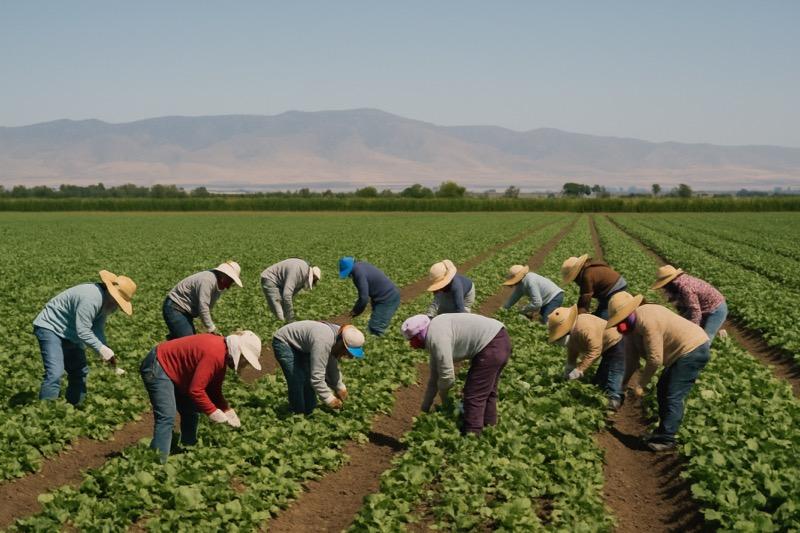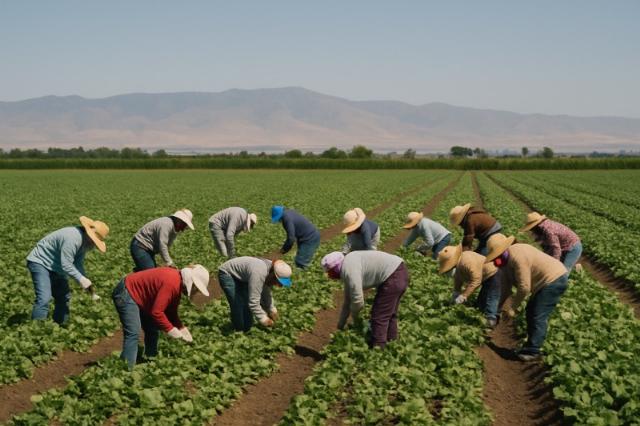


Let me just state this right up front. Farmers in America, particularly ones that employ several to more than a hundred workers, are not unsophisticated country bumpkins. There will be no whining in this essay along the lines of “Oh, the poor farmer! He does not know how to fill out online federal forms for income tax withholding, immigration, etc.” That’s farm animal excrement! Farmers EFT their own quarterly income tax payments, so they can certainly make payments for their workers’ withholding.
President Trump has listened to the sad stories of loving employers and their willing wage workers providing our food in harmony for years together. In his desire not to disrupt agricultural commerce, he has listened to descriptions of fields full of rotting produce. But sad stories aside, it’s a bad idea to exempt a small segment of the economy from the rules, and it’s entirely unnecessary. Let’s look at some statistics to see if we can’t acquire a better-informed perspective than random anecdotes have provided.

Image by ChatGPT.
The latest Census of Agriculture reports that, in 2022, we had 1,900,487 farms in America on 880,100,848 acres producing $543 billion in market value of agricultural products sold. Eighty-five percent were owned by families or individuals, 7% by partnerships, and 7% by corporations. Of this number, only 1.5% of farms—28,464—hired migrant workers. Half of those employing migrants sold $1 million or more (market value) of agricultural products.
There were 3,693,391 farm workers, 41% of them unpaid (i.e., owners and their families). Of the paid farm workers, 32% were native-born Americans, 7% foreign-born US citizens, 19% authorized foreign-born workers (immigrants and temporary nonimmigrants), and 42% (917,487) were illegal aliens. Only 25% of all farm workers are illegal aliens.
What do we know about them? Almost all of them (86%) are from Mexico, so home is close by. California has more of them than any other state. Estimates are that California has between 375,000 and 500,000 undocumented agricultural workers. Florida has about 300,000. That’s almost all the undocumented right there in only two states.
To recap: Only 1.5% of all farms, half of whom sold $1 million or more in product, employ migrant workers.
Washington State’s cherry harvest lasts two months, pears a month, and apples about 10 weeks. In Florida, the sugar cane and orange harvests run about six months long. Planting and harvesting fresh produce is a year-round job in California.
The H2A temporary agricultural worker visa program has certain requirements that must be met. Employers petitioning for farm workers must provide transportation to and from the workers’ home countries. They must provide housing and either a food preparation area or access to prepared food. The employer must provide full-time work and wages in accordance with standard wages for American farm workers. The workplace must meet all federal and state safety, hygiene, and environmental mandates.
The employer, including any consortium of employers who together offer full-time employment, must file a petition with the Department of Labor to show the need for migrant labor. The employer must then file a petition with the US Citizenship and Immigration Services for the alien worker. There are companies that handle all of this for a fee.
The potential worker must be eligible for an H2A agricultural worker nonimmigrant (temporary) visa and must not be otherwise ineligible. The worker cannot work for employers other than the petitioner(s) without prior permission from USCIS, and is limited to no more than three years in the US before the worker must take a break of at least 60 days outside of the US.
If President Trump were to allow illegal farm workers to continue their work, that would promote continued criminality on the part of both the worker and the employer. It unbalances the marketplace when criminal activities result in profits greater than those who follow the law earn. Without enforcement, we dispense with the rule of law and subject ourselves to violations of the Equal Protection Clause.
Moreover, rewarding lawlessness erodes the nation’s conscience. Some of these workers were trafficked, some have criminal histories, and others are using false or stolen identities. Many are not receiving their rightful benefits or legal wages; some face unsafe and environmentally hazardous working conditions. For us to wink at this in the name of cheaper strawberries pollutes our own souls.
What should we do? Balance justice and mercy. Put the country on notice that the government will no longer tolerate exploiting migrant agricultural workers, just as the administration has declared that all illegals face deportation. Then provide a grace period so that employers can bring their working conditions, wages, and benefits into compliance with the law and send their workers home to get proper work visas. The grace period will allow the workers to obtain documentation (passports, etc.) under their valid identities. Mexican Consulates in the United States should be prepared to undertake this volume of work.
States that depend on migrant workers for their ag sector should jump in to assist with verifying the need for foreign workers. The Department of Labor, the US Citizenship and Immigration Service, and the Department of State need to streamline the petitioning and visa application processes. This would be the perfect task for D.O.G.E. to undertake.
A migrant worker who has lived here illegally will raise questions regarding the requirement that he has a home outside of America to which he intends to return after the job is finished. That, however, can be addressed through the interview process at a US consulate or embassy abroad.
This can all be accomplished with minor changes to existing procedures. No new laws have to be passed. That lets Congress off the hook on this issue.
And let it be known that after the grace period, those not in compliance will face ICE raids, OSHA inspections, EPA investigations, and IRS audits. We freed the slaves 162 years ago. It’s time to obliterate the last vestiges of those practices. And to those crying, “Who will pick my blueberries?” I say shame on you. Do better. Maybe even think about growing or picking your own.
Anony Mee is the nom de blog of a retired public servant who was a seasonal farm worker from the age of 12 through 19 and X-tweets at oh_yeahMee.
